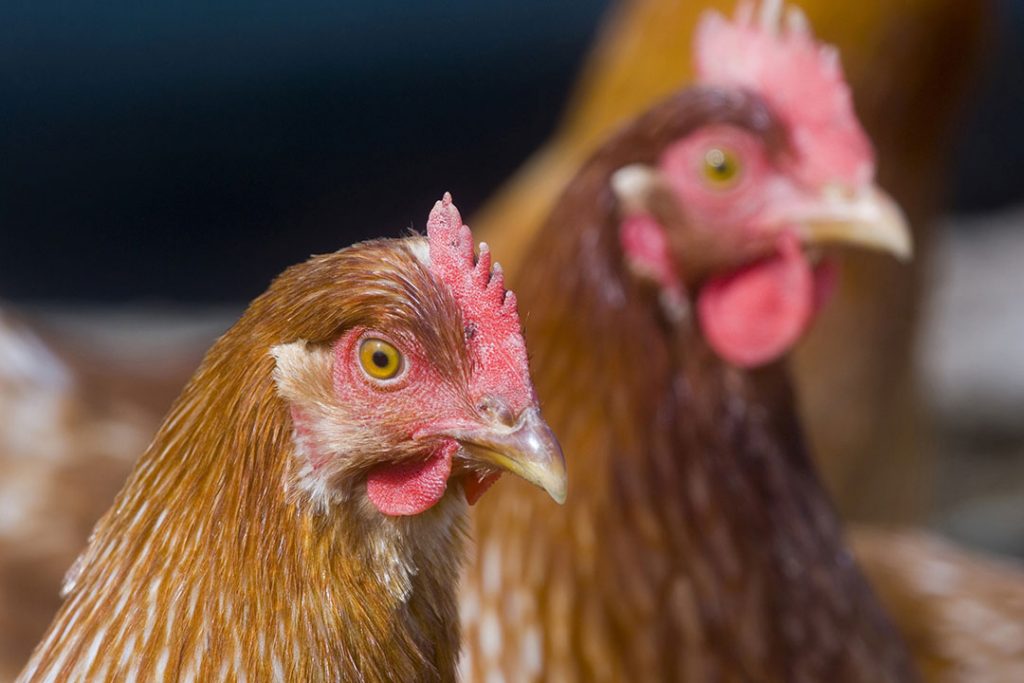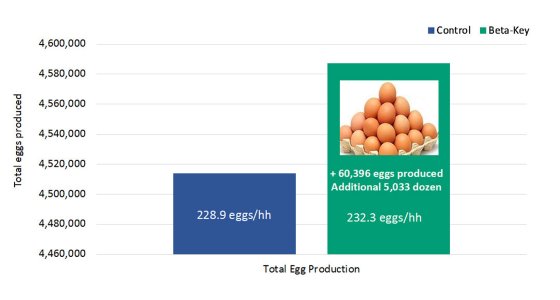Betaine is a functional nutrient commonly used as a feed additive in animal nutrition, mainly as methyl donor. What role can betaine play in the diets of laying hens and what are the effects?
e fulfilled in the diet from raw ingredients. Betaine can donate directly one of its methyl groups into methylation cycle, whereas choline requires a 2-step enzymatic transformation in the mitochondria within liver cells. Therefore, betaine will be more efficient as methyl donor compared to choline. Extra betaine molecules are able to infiltrate cells to maintain (intestinal) cell integrity, protein structure, and homeostasis. Maintaining intestinal cell integrity and gut health is the foundation of improving liveability, nutrient digestibility and production.
Commercial trial
To prove the beneficial effects of betaine compared to choline, a US commercial paired-house study was conducted over the course of a layer’s production period. At 21 weeks of age, Lohman brown layers in a cage-free system were either given a control diet that included 500 ppm of 60% choline chloride or a diet replacing this choline with 348 ppm of Excential Beta-Key (betaine hydrochloride 95%). At 348 ppm, Excential Beta-Key is replacing 100% equimolar equivalence of the 500 ppm 60% choline chloride, meaning both control and test diet provided the same molecular amount of methyl donors, as choline or betaine, respectively.
Production data has showed that by 59 weeks of age or, 38 weeks from the start of the trial the average eggs per hen housed improved by 3.4 eggs. In production standpoint, a total of 60,396 more eggs were produced as seen in Figure 1.
Figure 1 – Cumulative egg production from 21-59 weeks of age.
Without management change other than adding betaine, in the US market the addition of Excential Beta-Key at 348 ppm and replacing added choline chloride was calculated to result in a ROI of at least 6:1 in a 20,000-bird production.
Influence on litter moisture and mortality
Another important parameter in management of poultry is litter moisture. Improved digestibility and intestinal cell growth have been associated with added betaine. These factors are attributed to improved water retention of the animal and thus controlling excreta.
Increased litter moisture decreases litter quality and can lead to production issues including but not limited to elevated ammonia levels, increased problems with footpad quality and dirty eggs. Improving nutrient digestibility by supplementing betaine can also impact litter moisture. During the commercial trial, litter samples throughout both houses were collected at 35, 45 and 55 weeks. Although as seen in Table 1, litter moisture was well-managed, adding betaine hydrochloride significantly reduced moisture by over 3%. Using betaine hydrochloride instead of choline chloride, especially in houses that are in need to control moisture may be a useful tool for producers.
Mortality and liveability are also key attributes to a successful flock. As seen in Table 2, betaine reduced mortality of the flock by up to 1.98%.
Betaine is a useful tool for producers
Excential Beta-Key can replace 100% of added choline chloride in layers. Because efficiency of betaine as a methyldonor is higher compared to choline, the surplus of betaine available to layers enhances cellular efficiency and helps to improve performance. By reducing mortality and litter moisture, betaine is a useful tool for producers to improve overall layer liveability. By increasing the efficiency of osmoregulation, the surplus of betaine may be reducing protein degradation in the egg, therefore betaine improves egg quality and prolongs freshness.
Post time: Oct-09-2021







